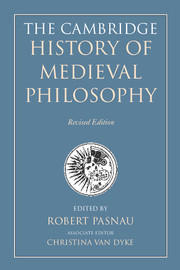Book contents
- Frontmatter
- Contents of Volume 1
- Preface
- List of contributors
- Frontmatter
- Contents of Volume 2
- Introduction
- I Fundamentals
- II Logic and language
- III Natural philosophy
- IV Soul and knowledge
- V Will and desire
- VI Ethics
- 33 Happiness
- 34 Identity and moral agency
- 35 The inclination for justice
- 36 Virtue theory
- 37 Action and intention
- 38 Practical ethics
- VII Political philosophy
- VIII Metaphysics
- IX Theology
- Appendices
- Bibliography of primary sources
- Bibliography of secondary sources
- Index nominum
- Index rerum
- References
37 - Action and intention
from VI - Ethics
Published online by Cambridge University Press: 05 August 2014
- Frontmatter
- Contents of Volume 1
- Preface
- List of contributors
- Frontmatter
- Contents of Volume 2
- Introduction
- I Fundamentals
- II Logic and language
- III Natural philosophy
- IV Soul and knowledge
- V Will and desire
- VI Ethics
- 33 Happiness
- 34 Identity and moral agency
- 35 The inclination for justice
- 36 Virtue theory
- 37 Action and intention
- 38 Practical ethics
- VII Political philosophy
- VIII Metaphysics
- IX Theology
- Appendices
- Bibliography of primary sources
- Bibliography of secondary sources
- Index nominum
- Index rerum
- References
Summary
Near the beginning of the second part of the Summa theologiae, Thomas Aquinas offers a detailed analysis of human action. This analysis presupposes that the human act has an objective, complex, and morally significant structure (see 1a2ae 18.4 ad 3), and that any adequate moral theory will give a central place to this structure. Today, even those most sympathetic to Aquinas’s moral theory are likely to find these presuppositions unconvincing and the details of his analysis bewildering. Yet Aquinas was hardly alone, either in his presuppositions or in the attention he devoted to the analysis of human action. On the contrary, earlier Latin discussions contain a rich and complex debate over the moral and theological significance of the structure of the human act. The terms of this debate are complex and by no means identical to Aquinas’s own. For that very reason it is worth examining in its own right, for its substantive interest and also for its continuing relevance to contemporary moral and legal philosophy. What follows represents an attempt to trace the main lines of this debate, without claiming an exhaustive treatment. Given its continuing importance, Aquinas’s analysis will be given extended attention, but as will be apparent, that analysis is only fully comprehensible in the context of the preceding debate.
ACTION AND INTENTION IN EARLIER LATIN THOUGHT
The late eleventh and early twelfth centuries comprised a period of far-reaching institutional development and reform, both in the church and in civil society. In this context, long-standing questions about the meaning of sin or wrongdoing and the status of problematic actions took on new urgency. Throughout the twelfth and thirteenth centuries, theologians and jurists devoted considerable attention to identifying the components of the human act in virtue of which it is sinful or praiseworthy, and drawing out the practical consequences of this analysis. At the same time, the twelfth and thirteenth centuries were also marked by intense attention to the inner life of the individual and to the value and appropriate expressions of inner freedom.
- Type
- Chapter
- Information
- The Cambridge History of Medieval Philosophy , pp. 506 - 516Publisher: Cambridge University PressPrint publication year: 2014



